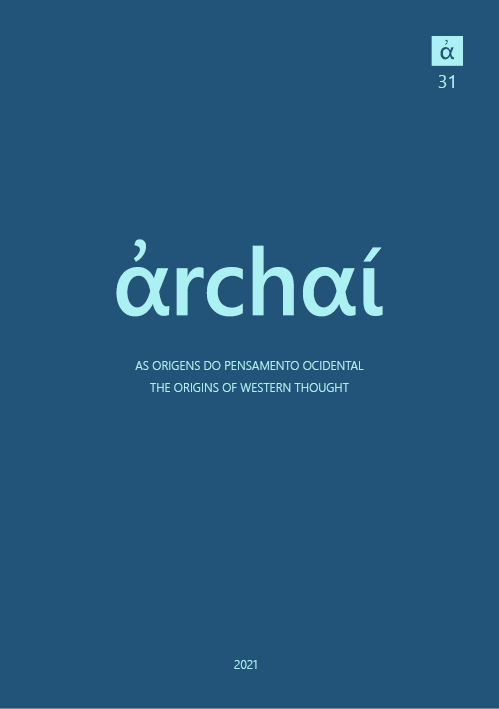Enseñar la sophrosyne: el uso del elenchos del Sócrates de Jenofonte
DOI:
https://doi.org/10.14195/1984-249X_31_08Palavras-chave:
Jenofonte, elenchos, sophrosyne, educación, políticaResumo
El elenchossocrático en la obra de Jenofonte desempeña un papel central aunque pareciera tener un rol secundario. El siguiente artículo se propone trabajar sobre la caracterización jenofontea del elenchos socrático, así como su valoración desde e punto de vista de sus cualidades educativas. En este sentido, se analizarán las potencialidades del elenchossocrático en tres direcciones: en primer lugar, la dimensión estrictamente formativa; en segundo lugar, su rol para la actuación en los asuntos políticos; y, por último, su contribución con la adquisición de la sophrosyne. A través de este análisis expondré por qué el retrato realizado por Jenofonte de Sócrates debe ser entendido como suplementario a los retratos hechos por otros (como en el caso de Platón) y no como una alternativa a ellos.
Downloads
Referências
AHBEL-RAPPE, S., R. KAMTEKER (eds.) (2009). A Companion to Socrates. Oxford, Wiley-Blackwell.
BENSON, H. (1987). “The problem of the Elenchus reconsidered”. Ancient Philosophy 7. p. 67-85.
BENSON, H. (1995). “The Dissolution of the Problem of the Elenchus”. Oxford Studies in Ancient Philosophy 13. p. 45-112.
BEVILACQUA, F. (2018). “An Explicit Political Plan: Memorabilia II, 6, 22-27”. En: Danzig, Johnson y Morrison (eds). Plato and Xenophon: Comparative Studies. Mnemosyne Suppl. 417. Leiden, Brill. p. 461-486.
DANZIG, G. (2010). Apologizing for Socrates. Lanham, Lexington. DANZIG, G. (2012). “The best of the Achaemenids: Benevolence, self-interest and the ‘ironic’ reading of Cyropaedia”. En: F. Hobden y C. Tuplin (eds.) Xenophon: Historical Method and Moral Principle. Leiden, Brill. p. 499-539.
DANZIG, G. (2014). “Alcibiades versus Pericles: Apologetic Strategies in Xenophon’s Memorabilia”. Greece and Rome 61. p. 7- 28.
DANZIG, G. (2017). “Nature, Culture and The Rule of the Good in Xenophon’s Socratic Theory of Friendship: Memorabilia Book Two”. En: MOORE y STAVRU (eds.) Socrates and the Socratic Dialogue. Leiden and Boston, Brill. p. 459-480.
DORION, L.-A., M. BANDINI. (2010). Xénophon Mémorables. Paris, Les Belles Lettres.
DORION, L.-A. (2002). “La responsibilité de Cyrus dans le déclin de l’empire perse selon Platon et Xénophon”. Revue Française d’Histoire des Idées Politiques 16. p. 369-386.
DORION, L.-A. (2004). Platon. Charmide Lysis. Paris, Flammarion.
DORION, L.-A. (2009). “Xenophon’s Sócrates”. En: AHBEL- RAPPE y KAMTEKER (eds.). A companion to Socrates. Oxford, Blackwell. p. 93-109.
DORION, L.-A. (2013). L’Autre Socrate: Études sur les écrits socratiques de Xénophon. Paris, Les Belles Lettres.
GERA, D. (1993). Xenophon’s Cyropaedia. Oxford, Oxford University Press.
HESK, J. (2003). Sophocles: Ajax. London, Duckworth.
JOHNSON, D. (2005). “Xenophon at his most Socratic (Memorabilia 4.2)”. Oxford Studies in Ancient Philosophy 29. p. 39- 73.
JOHNSON, D. (2018). “Xenophon’s Intertextual Socrates”. En: Danzig, Johnson, Morrison (eds.). Plato and Xenophon: Comparative Studies. Mnemosyne Suppl. 417. Leiden, Brill. p. 71- 98.
KAHN, Ch. (1983). “Drama and Dialectic in Plato’s Gorgias”. Oxford Studies in Ancient Philosophy 1. p. 75-121.
LACHANCE, G. (2018). “The logical form of the elenchus in Xenophon and Plato”. En: DANZIG, JOHNSON, MORRISON (eds.). Plato and Xenophon: Comparative Studies. Mnemosyne Suppl. 417. Leiden, Brill. p. 165-183.
LUZ, M. (2015). “Socrates, Alcibiades and Antisthenes in PFlor II”. En: ZILIOLI, U. (ed.) From the Socratics to the Socratic School. London, Routledge. p. 192-210.
MORRISON, D. (1994). “Xenophon’s Socrates as a Teacher”. En: WAERDT, P. V. (ed.). The Socratic Movement. Ithaca, Cornell University Press. p. 181-208.
NORTH, H. (1966). Sophrosyne: Self-Knowledge and Self-Restraint in Greek Literature. Ithaca, Cornell University Press.
POLANSKY, R. M. (1985). “Professor Vlastos’s Analysis of the Socratic Elenchus”. Oxford Studies in Ancient Philosophy 3. p. 247- 260.
RADEMAKER, A. (2005). Sophrosyne and the Rhetoric of Self- Restraint: Polysemy and Persuasive Use of an Ancient Greek Value Term. Mnemosyne Suppl. 259. Leiden, Brill.
ROBINSON, R. (1941). Plato’s Earlier Dialectic. Ithaca, Cornell University Press.
ROSSETTI, L. (2011). “L’Euthydème de Xénophon”. En: Le dialogue Socratique. Paris, Les Belles Lettres. p. 55-100.
SANDERS, K. (2011). “Don’t Blame Socrates: Xen. Mem. 1.2.40- 46”. Classical Philology Vol. 106, 4. p. 349-356.
SLINGS, S. R. (1981). A commentary on the Platonic Clitophon. Amsterdam, Academische Pers.
VLASTOS, G. (1983). “The Socratic Elenchus”. Oxford Studies in Ancient Philosophy 1. p. 27-58.
VLASTOS, G. (1985). “Socrates’ Disavowal of Knowledge”. Philosophical Quarterly 138. p. 1-31.
Downloads
Publicado
Como Citar
Edição
Seção
Licença
Copyright (c) 2021 Gabriel Danzig

Este trabalho está licenciado sob uma licença Creative Commons Attribution 4.0 International License.
Dado o acesso público desta revista, os textos são de uso gratuito, com obrigatoriedade de reconhecimento da autoria original e da publicação inicial nesta revista. O conteúdo das publicações é de total e exclusiva responsabilidade dos autores.
1. Os autores autorizam a publicação do artigo na revista.
2. Os autores garantem que a contribuição é original, responsabilizando-se inteiramente por seu conteúdo em caso de eventual impugnação por parte de terceiros.
3. Os autores garantem que a contribuição que não está em processo de avaliação em outras revistas.
4. Os autores mantêm os direitos autorais e concedem à revista o direito de primeira publicação, sendo o trabalho licenciado sob a Creative Commons Attribution License-BY.
5. Os autores têm permissão e são estimulados a publicar e distribuir seu trabalho on-line após a publicação na revista.
6. Os autores dos trabalhos aprovados autorizam a revista a, após a publicação, ceder seu conteúdo para reprodução em indexadores de conteúdo, bibliotecas virtuais e similares.
7. É reservado aos editores o direito de proceder ajustes textuais e de adequação do artigo às normas da publicação.



